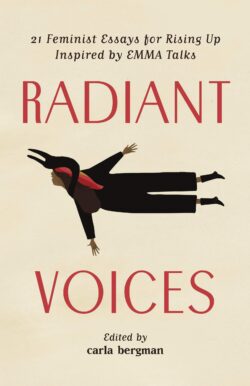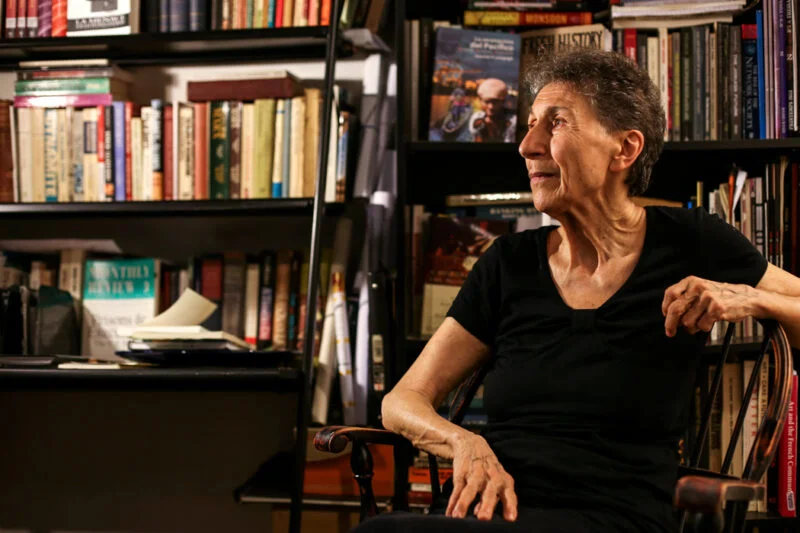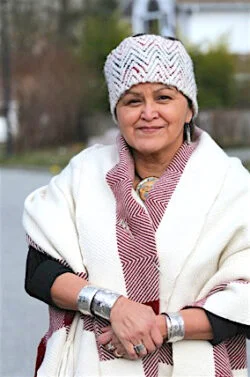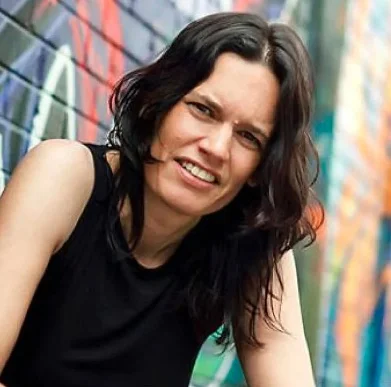#911 A space for feminine voices
Radiant Voices: 21 Feminist Essays for Rising Up Inspired by EMMA Talks
by carla bergman (compiler and editor)
Victoria: TouchWood Editions, 2019
$22.00 / 9781927366844
Reviewed by Natalie Lang
*
 If you’ve ever taken the time to observe birds, you might notice them flying up into the sky and then swooping down in magnificent arcs. You will hear their birdsong as they tell family, friends, and flock what they see and where they’ve been. Throughout the day they chatter away with story after story of the latest gossip that surely every other bird in the vicinity will want to know. In many cultures birds symbolize freedom. Birds make an exquisite symbol of the voices, stories, and purpose behind Radiant Voices: 21 Feminist Essays for Rising Up Inspired by EMMA Talks, compiled and edited by carla bergman.
If you’ve ever taken the time to observe birds, you might notice them flying up into the sky and then swooping down in magnificent arcs. You will hear their birdsong as they tell family, friends, and flock what they see and where they’ve been. Throughout the day they chatter away with story after story of the latest gossip that surely every other bird in the vicinity will want to know. In many cultures birds symbolize freedom. Birds make an exquisite symbol of the voices, stories, and purpose behind Radiant Voices: 21 Feminist Essays for Rising Up Inspired by EMMA Talks, compiled and edited by carla bergman.
bergman, employing the metaphor of birds learning to fly, using their voice, and taking over the skies, presents a series of feminine-voiced essays based on speeches given at various EMMA Talks conventions in Vancouver. EMMA, an acronym for Engaging Monologue Mutual Aid, as well as a nod toward the famous Emma Goldman, an anarchist and political activist in the early 20th century, is a mini-art festival and speaker series whose purpose is to “bring important stories by cis women and two-spirited, trans, and gender-non-conforming folks who are writers, activists, thinkers, and storytellers, makers, and doers, from the periphery to the public” (p. 5).


The talks were conceived and developed by bergman and Astra Taylor in 2011. While preparing materials for a seminar class in Vancouver, bergman was surprised to discover the limited number of high-quality videos of cisgender women, trans women, and gender non-conforming individuals compared to the overwhelming number by white cis men. The result, after conversations between bergman and Taylor, and collaborations with Sylvia McFadden and many others, was the creation of a version of TED talks that provided a specific space for feminine voices. After many successful conferences, Taryn Boyd, publisher at TouchWood Editions in Victoria, suggested the publication of a companion book to provide another platform for voices to tell their stories in public. Radiant Voices is the result.
In her introduction, bergman outlines key themes curated in the book including finding voice, politics, love, celebration, matriarchy, connection, and belonging, out of which emerge “a feminist anthology of unique, diverse, personal, and fiercely political stories” (p. 3). She aims to bring forward an understanding of the collective power of feminine voices to engage in dialogue to listen, read, and view each other. A common thread is an emphasis on the “invitation and inclusion of rarely heard voices alongside well known folks” (p. 2) and to provide space to hear voices that are often silenced. bergman’s goal, through the conception of EMMA Talks and the essays in this book, is “to inspire, evoke change, and provide courage that enables us to act in solidarity and engage more passionately with our own powers” (p. 3). She has certainly done this with her careful curation of these powerful essays that we all, regardless of how we identify, would benefit from reading.

Radiant Voices is organized into chapters introduced thematically with a poem written by bergman. Her poems, which also form the cover and jacket art, connect with the volume’s avian metaphor and symbolism. Her poems, “Hovering,” “Assemble,” “Formation,” “Alighted,” “Ascending,” and “Soaring,” mark different stages in the journey towards learning to fly and sing with confidence for the world to hear. The essays are a powerhouse of shared humanity where readers, writers, and speakers can come together to form a powerful dialogue of shared understanding, historical context, shocking revelation, and the personal pursuit of telling stories and being heard. Some essays are light and thought-provoking; others challenge our core beliefs and world understandings. They provide multiple understandings of a collective journey to an equitable world where every voice is heard to promote liberation through change, growth, and love.
An essay in Chapter 1, Silvia Federici’s “On the Meaning of Gossip,” considers the history of gossip itself. Federici outlines its original meaning, explains how it was changed and twisted to fit a negative purpose, which, in turn, disintegrated the integrity of women gathering in groups. Politics, guilds, and fear of women speaking freely caused “‘gossip’ [to turn] from a word of friendship and affection into a word of denigration and ridicule” (p. 44). Federici demonstrates that women had been been “the weavers of memory” (p. 45) before history silenced them. They were forced into the forgotten corners of society where the world hoped they wouldn’t be heard from.


Radiant Voices contains other powerful contributions from BC writers. One is Vancouver-born Dorothy Woodend, the culture editor for The Tyee, whose work has been published in magazines and books across Canada and who has collaborated on film and writing projects. Her essay, “Being Democratic,” considers a documentary film by Astra Taylor (“What is Democracy?”), where Taylor seeks to explain what democracy means and whether we can truly achieve it. She starts with “…that old Socratic Question: How Shall We Live?” (p.77). Woodend explores issues pertinent to democracy today and, like other voices in the collection, begs readers to reconsider what they think they know.
In “Everything Inside of Us,” Tasnim Nathoo, Vancouver-based writer, social worker, and consultant, uses a history lesson on root vegetables, including the carrot, beet, and “unfashionable parsnip,” to initiate a discussion on what we think we know about our bodies and the medical system. She asks readers to learn to love themselves and their bodies with the understanding that “Everything we need to heal is inside of us.” She challenges “A disbelief in our innate ability to heal [which] seems a consequence of modern life” (p. 156). Nathoo combats a belief system surrounding the modern medical structure and suggests other approaches to living well.

EMMA Talks, combined with the essays in Radiant Voices, allow a space for connection, exchange of new ideas, and challenges to the status quo. In “L’hen Awtxw: Weaving Knowledge Into the Future,” Chief Janice George — master weaver and teaching artist from the Squamish Nation — writes about family, loss, pain, and trauma. Like Nathoo, she points out that for “every single event that happens in your life… there is a way to take care of yourself” (p. 164). While Nathoo looks to the body to heal, George looks to culture and traditions for new generations to help heal themselves and grow. George makes a monumental observation in recounting her ancestors: “I thought you loved me — you loved me back then. It is so amazing when you think about it. Their prayers are still here, and they loved us. They thought about us” (p. 167). The notion that those who came before had the foresight to consider future generations is a humbling and striking reminder that we may learn the weight of important traditional Indigenous values with the power to connect us all.
Similarly, the last chapter by Leanne Betsamosake Simpson concerns a “very old traditional Mississauga Nishnaabeg story” (p. 179). When the Binoojinh (child) learns to tap maple trees and discovers maple syrup, she “is met with very basic, core, Nishnaabeg values: love, compassion, and understanding” (p. 183).

These values, perhaps, sum up Radiant Voices. They may inspire readers to visit the EMMA Talks website and consider the talks there alongside the essays here. “In every little town, in every village, and every country you can think of, women are on the move,” writes contributor dr. amina wadud. “[They] are a force to be reckoned with. [They] will not be pushed back. So it is amazing to be living now and to be a part of it all — to feel that collective push” (p. 173).
Regardless of how we identify, as women, men, cis gendered, two spirited, trans, and gender non-conforming folk, we can be part of the conversation toward greater connection. And as bergman notes, “Even in our darkest times, love persists. Feeling our connection is vital to (re)imagining how we can be…. especially in these troubled times” (p. 4).
carla bergman has prepared a remarkable collection of essays. She catches the working themes and purpose of EMMA Talks within each essay and shines a light on their individuality. Radiant Voices suggest it is time to give a voice to those normally pushed aside or silenced; time to empower each other; time to join together as a community and work toward collective systemic change where you can learn to love yourself and drink up life as it comes, knowing you have the strength and support to lift you if you falter. A dialogue for change has begun.
*

Natalie Lang is a teacher and writer. She is also currently a master’s student in the GLS (Graduate of Liberal Studies) program at SFU. She is based in Abbotsford, BC, where she teaches literature at Rick Hansen Secondary, and lives in a renovated barn in the heart of Sumas Mountain. Editor’s note: For The Ormsby Review, Natalie has reviewed books by Sonnet L’Abbé, Larry Hannant, Tanya dePape, Emily Lycopolus, Alicia Tobin, and Cait Flanders.
*
The Ormsby Review. More Books. More Reviews. More Often.
Publisher and Editor: Richard Mackie
The Ormsby Review is a journal service for in-depth coverage of B.C. books and authors. The Advisory Board consists of Jean Barman, Robin Fisher, Cole Harris, Wade Davis, Hugh Johnston, Patricia Roy, David Stouck, and Graeme Wynn. Scholarly Patron: SFU Graduate Liberal Studies. Honorary Patron: Yosef Wosk. Provincial Government Patron since September 2018: Creative BC
“Only connect.” – E.M. Forster
3 comments on “#911 A space for feminine voices”
Thanks for this insightful and thorough review, Natalie. Ordering the book!